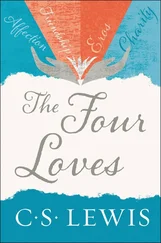And all the while they remain unaware of the real road. "If you would be loved, be lovable," said Ovid. That cheery old reprobate only meant, "If you want to attract the girls you must be attractive," but his maxim has a wider application. The amorist was wiser in his generation than Mr. Pontifex and King Lear.
The really surprising thing is not that these insatiable demands made by the unlovable are sometimes made in vain, but that they are so often met. Sometimes one sees a woman's girlhood, youth and long years of her maturity up to the verge of old age all spent in tending, obeying, caressing, and perhaps supporting, a maternal vampire who can never be caressed and obeyed enough. The sacrifice—but there are two opinions about that—may be beautiful; the old woman who exacts it is not.
The "built–in" or unmerited character of Affection thus invites a hideous misinterpretation. So does its ease and informality.
We hear a great deal about the rudeness of the rising generation. I am an oldster myself and might be expected to take the oldsters' side, but in fact I have been far more impressed by the bad manners of parents to children than by those of children to parents. Who has not been the embarrassed guest at family meals where the father or mother treated their grown–up offspring with an incivility which, offered to any other young people, would simply have terminated the acquaintance? Dogmatic assertions on matters which the children understand and their elders don't, ruthless interruptions, flat contradictions, ridicule of things the young take seriously—sometimes of their religion—insulting references to their friends, all provide an easy answer to the question "Why are they always out? Why do they like every house better than their home?" Who does not prefer civility to barbarism?
If you asked any of these insufferable people—they are not all parents of course—why they behaved that way at home, they would reply, "Oh, hang it all, one comes home to relax. A chap can't be always on his best behaviour. If a man can't be himself in his own house, where can he? Of course we don't want Company Manners at home. We're a happy family. We can say anything to one another here. No one minds. We all understand."
Once again it is so nearly true yet so fatally wrong. Affection is an affair of old clothes, and ease, of the unguarded moment, of liberties which would be ill–bred if we took them with strangers. But old clothes are one thing; to wear the same shirt till it stank would be another. There are proper clothes for a garden party; but the clothes for home must be proper too, in their own different way. Similarly there is a distinction between public and domestic courtesy. The root principle of both is the same: "that no one give any kind of preference to himself." But the more public the occasion, the more our obedience to this principle has been "taped" or formalised. There are "rules" of good manners. The more intimate the occasion, the less the formalisation; but not therefore the less need of courtesy. On the contrary, Affection at its best practises a courtesy which is incomparably more subtle, sensitive, and deep than the public kind. In public a ritual would do. At home you must have the reality which that ritual represented, or else the deafening triumphs of the greatest egoist present. You must really give no kind of preference to yourself; at a party it is enough to conceal the preference. Hence the old proverb "come live with me and you'll know me". Hence a man's familiar manners first reveal the true value of his (significantly odious phrase!) "Company" or "Party" manners. Those who leave their manners behind them when they come home from the dance or the sherry party have no real courtesy even there. They were merely aping those who had.
"We can say anything to one another." The truth behind this is that Affection at its best can say whatever Affection at its best wishes to say, regardless of the rules that govern public courtesy; for Affection at its best wishes neither to wound nor to humiliate nor to domineer. You may address the wife of your bosom as "Pig!" when she has inadvertently drunk your cocktail as well as her own. You may roar down the story which your father is telling once too often. You may tease and hoax and banter. You can say "Shut up. I want to read". You can do anything in the right tone and at the right moment—the tone and moment which are not intended to, and will not, hurt. The better the Affection the more unerringly it knows which these are (every love has its art of love ). But the domestic Rudesby means something quite different when he claims liberty to say "anything". Having a very imperfect sort of Affection himself, or perhaps at that moment none, he arrogates to himself the beautiful liberties which only the fullest Affection has a right to or knows how to manage. He then uses them spitefully in obedience to his resentments; or ruthlessly in obedience to his egoism; or at best stupidly, lacking the art. And all the time he may have a clear conscience. He knows that Affection takes liberties. He is taking liberties. Therefore (he concludes) he is being affectionate. Resent anything and he will say that the defect of love is on your side. He is hurt. He has been misunderstood.
He then sometimes avenges himself by getting on his high horse and becoming elaborately "polite". The implication is of course, "Oh! So we are not to be intimate? We are to behave like mere acquaintances? I had hoped—but no matter. Have it your own way." This illustrates prettily the difference between intimate and formal courtesy. Precisely what suits the one may be a breach of the other. To be free and easy when you are presented to some eminent stranger is bad manners; to practice formal and ceremonial courtesies at home ("public faces in private places") is—and is always intended to be—bad manners. There is a delicious illustration of really good domestic manners in Tristram Shandy . At a singularly unsuitable moment Uncle Toby has been holding forth on his favourite theme of fortification. "My Father," driven for once beyond endurance, violently interrupts. Then he sees his brother's face; the utterly unretaliating face of Toby, deeply wounded, not by the slight to himself—he would never think of that—but by the slight to the noble art. My Father at once repents. There is an apology, a total reconciliation. Uncle Toby, to show how complete is his forgiveness, to show that he is not on his dignity, resumes the lecture on fortification.
But we have not yet touched on jealousy. I suppose no one now believes that jealousy is especially connected with erotic love. If anyone does the behaviour of children, employees, and domestic animals, ought soon to undeceive him. Every kind of love, almost every kind of association, is liable to it. The jealousy of Affection is closely connected with its reliance on what is old and familiar. So also with the total, or relative, unimportance for Affection of what I call Appreciative love. We don't want the "old, familiar faces" to become brighter or more beautiful, the old ways to be changed even for the better, the old jokes and interests to be replaced by exciting novelties. Change is a threat to Affection.
A brother and sister, or two brothers—for sex here is not at work—grow to a certain age sharing everything. They have read the same comics, climbed the same trees, been pirates or spacemen together, taken up and abandoned stamp–collecting at the same moment. Then a dreadful thing happens. One of them flashes ahead—discovers poetry or science or serious music or perhaps undergoes a religious conversion. His life is flooded with the new interest. The other cannot share it; he is left behind. I doubt whether even the infidelity of a wife or husband raises a more miserable sense of desertion or a fiercer jealousy than this can sometimes do. It is not yet jealousy of the new friends whom the deserter will soon be making. That will come; at first it is jealousy of the thing itself—of this science, this music, of God (always called "religion" or "all this religion" in such contexts). The jealousy will probably be expressed by ridicule. The new interest is "all silly nonsense", contemptibly childish (or contemptibly grown–up), or else the deserter is not really interested in it at all—he's showing off, swanking; it's all affectation. Presently the books will be hidden, the scientific specimens destroyed, the radio forcibly switched off the classical programmes. For Affection is the most instinctive, in that sense the most animal, of the loves; its jealousy is proportionately fierce. It snarls and bares its teeth like a dog whose food has been snatched away. And why would it not? Something or someone has snatched away from the child I am picturing his life–long food, his second self. His world is in ruins.
Читать дальше











